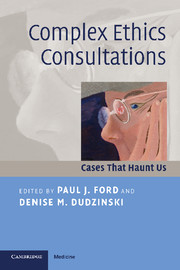Book contents
- Frontmatter
- Contents
- List of contributors
- Foreword
- Acknowledgments
- Introduction: Live and learn: courage, honesty, and vulnerability
- Part I Starting at the beginning: prenatal and neonatal issues
- Part II The most vulnerable of us: pediatrics
- Part III Diversity of desires and limits of liberty: psychiatric and psychological issues
- Part IV Withholding therapy with a twist
- 13 Listening to the husband
- 14 You're the ethicist; I'm just the surgeon
- 15 Haunted by a good outcome: the case of Sister Jane
- 16 Is a broken jaw a terminal condition?
- Part V The unspeakable/unassailable: religious and cultural beliefs
- Part VI Human guinea pigs and miracles: clinical innovations and unorthodox treatment
- Part VII The big picture: organizational issues
- Conclusions, educational activities, and references
- Index
14 - You're the ethicist; I'm just the surgeon
Published online by Cambridge University Press: 03 May 2010
- Frontmatter
- Contents
- List of contributors
- Foreword
- Acknowledgments
- Introduction: Live and learn: courage, honesty, and vulnerability
- Part I Starting at the beginning: prenatal and neonatal issues
- Part II The most vulnerable of us: pediatrics
- Part III Diversity of desires and limits of liberty: psychiatric and psychological issues
- Part IV Withholding therapy with a twist
- 13 Listening to the husband
- 14 You're the ethicist; I'm just the surgeon
- 15 Haunted by a good outcome: the case of Sister Jane
- 16 Is a broken jaw a terminal condition?
- Part V The unspeakable/unassailable: religious and cultural beliefs
- Part VI Human guinea pigs and miracles: clinical innovations and unorthodox treatment
- Part VII The big picture: organizational issues
- Conclusions, educational activities, and references
- Index
Summary
Case narrative
We did not know what a long day it would be when we first received the call. Joe DeMarco, a visiting scholar from a state university's department of philosophy, was talking with Paul Ford, a bioethicist at a large teaching hospital, about how initial responses were handled for ethics consultations. During this conversation, Paul answered a page. After a brief conversation, he hung up, saying in a perplexed manner that it had been only three days. We quickly left the office, with Joe's initial concern only a reflection of Paul's enigmatic observation, “It's only been three days.”
“What do you mean it's only been three days?” Joe asked, not realizing how many times we would hear that phrase over the next eight hours. Paul explained, “It's only been three days since surgery, and the family wants the patient removed from life support.” Paul looked pensive; perhaps “worried” is too strong.
The consultation was initiated by Nurse Abigail, who was caring for the patient at bedside. However, the actual consult page came from the intensivist, Dr. Bryan.
Nurse Abigail told us her concern about the patient's suffering and about the family's wishes related to discontinuing life-sustaining treatment being ignored. Clearly, the circumstances upset her; she seemed somewhat angry. That was tempered by her respect for, maybe fear of, the patient's surgeon.
Mr. Carl, a 60-year-old man, had open-heart surgery three days prior. He had multiple medical problems, including kidney failure. He required continuous ventilator support through the entire postoperative course, and Mrs. Carl reported that he only occasionally communicated.
- Type
- Chapter
- Information
- Complex Ethics ConsultationsCases that Haunt Us, pp. 112 - 118Publisher: Cambridge University PressPrint publication year: 2008
- 2
- Cited by



